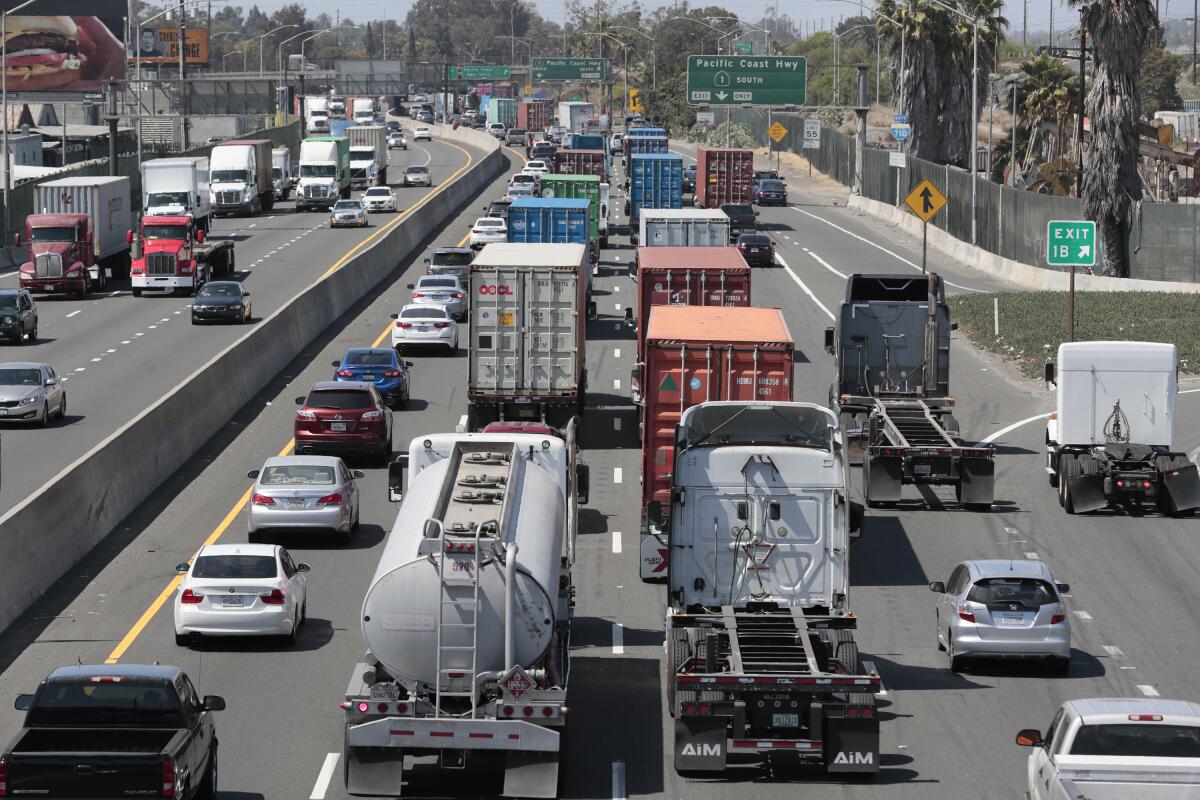L.A. transportation leaders stop short of pulling the plug on 710 Freeway expansion

- Share via
Los Angeles transportation officials denounced a proposal to widen the 710 Freeway on Thursday, but did not officially scrap the project — even as state and federal agencies have said the effort will not move forward because of its potential to worsen air quality and displace residents and businesses.
The half-hour debate at the Los Angeles County Metropolitan Transportation Authority’s board meeting highlighted transportation officials’ struggles in addressing the freeway’s vital role in the region’s economy and its environmental harms to the predominantly low-income Latino neighborhoods in Long Beach, Lynwood and Bell Gardens and others nearby.
“All you have to do is just take a walk or even a drive down the 710 corridor with your windows down and you’ll see what I’m talking about,” said Hilda Solis, chairwoman of the Los Angeles County Board of Supervisors and vice chair of the Metro Board of Directors.
“Thousands of diesel trucks and vehicles spew particulate matter and pollution into our low-income communities along the freeway, creating higher risks of cancer, asthma and other ailments,” she said.
The southern portion of the 710 Freeway, which runs about 20 miles from Long Beach to Alhambra, is one of the most critical economic transportation corridors in the country, linking the Ports of Los Angeles and Long Beach with the region’s network of warehouses and roadways that power the nation’s consumer economy.
More than 30% of the nation’s waterborne containerized shipping traffic comes through the two ports, with trucks bringing imported furniture, auto parts, electronics and clothing into the country via the 710 Freeway.
Plans to widen the southern portion of the freeway have been on the books for more than two decades, with the current $6-billion proposal calling for a new lane for zero-emission trucks along nearly the entire stretch from the ports through East Los Angeles and upgraded ramps and interchanges.
To limit air pollution, Metro officials also proposed funding a program to clean truck traffic by replacing diesel freight with low- and zero-emission alternatives. Currently, 50,000 diesel-fueled freight trucks and 165,000 other vehicles travel the freeway each day — far higher than traffic engineers’ projections from the 1960s.
But nearby residents are already dealing with some of the worst air quality in the country and elevated rates of asthma, and they fear that any expansion would exacerbate the situation. Additionally, plans call for the possible eviction of more than 100 families and 150 businesses, raising concerns that those displaced would not be able to find alternative places to live given L.A.’s housing affordability crisis.
Thursday’s discussion among Metro board members followed a March decision by the U.S. Environmental Protection Agency that the expansion would increase heavy-duty freight travel and probably violate Clean Air Act standards, even with Metro’s plans to clean truck traffic as part of the project.
The EPA’s action prompted California Department of Transportation Director Toks Omishakin to tell those at a public meeting earlier this month that the project couldn’t move forward as planned because of air quality and displacement issues.
Solis attempted to convince her fellow board members to cease work on the expansion, citing the federal and state decisions. But others pushed back, arguing that her plan could stall efforts to improve the freeway.
County Supervisor Janice Hahn, also a Metro board member, said the agency needed to clean the air along the corridor by electrifying trucks, pushing more port freight to the Alameda Corridor railway and making other environmental improvements. But she contended that 710 Freeway would need continue to handle vital commercial traffic far into the future.
“We’re not demolishing this freeway,” Hahn said. “But it is dilapidated. It has not kept up with the tripling of cargo that we’re having at both of our ports.... Fifty percent of the cargo that comes in there will always be trucked.”
The board ultimately endorsed further discussions between Metro and Caltrans over the project’s future.
Nevertheless, Metro board members and agency officials indicated they would not support any expansions of the 710 corridor that involved displacing residents. Metro CEO Phillip A. Washington said the agency had already set up meetings with California Department of Transportation officials to discuss plans for to move forward with all highway projects in the region.
“There should be local hire” of construction workers, Washington said. “There should be zero emissions. There should be no displacements.”
Community members who have long fought against the project said they were disappointed Metro did not take definitive action Thursday, but were pleased that board members were clear that the current proposal wasn’t likely to advance.
“We would have preferred to hear the language that it’s dead so we could dance on its grave,” said Laura Cortez, executive director of East Yard Communities for Environmental Justice, part of a coalition of organizations fighting the expansion. “But I don’t think it’s coming back in this form at all.”
More to Read
Sign up for Essential California
The most important California stories and recommendations in your inbox every morning.
You may occasionally receive promotional content from the Los Angeles Times.














